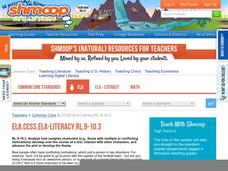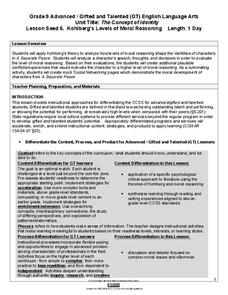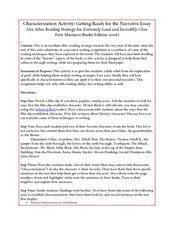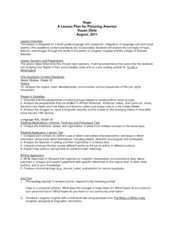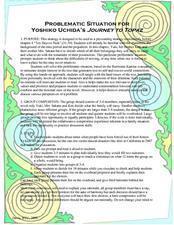Curated OER
Moby Dick Puppetry
Such an ambitious lesson! Third graders with special needs listen to an audio recording of the novel, Moby Dick. They stop often to discuss each of the main characters and analyze their actions in the story. They then make puppets of one...
Curated OER
To Strike or Not to Strike in 1830s Lowell: A Role Play
Role play as a person living in the 1830s working in a Lowell factory. The class will take on the role of factory owner, girl on strike, talk show host, and girl not wanting to strike. Each group will analyze and research their character...
Curated OER
The Breaking of Charity
The danger of mob mentality is on display in The Crucible by Arthur Miller. Get your class thinking with some challenging quickwrite questions, then assign characters from the play to be read aloud altogether. Links to worksheets for...
Shmoop
ELA.CCSS.ELA-Literacy.RL.9-10.3
Focus on complex characters with a lesson plan from a series that teaches individual skills from the Common Core. Specifically, this resource provides practice with standard RL.9-10.3. Get pupils thinking and talking about characters...
Curated OER
Making A Story Map
Sixth graders learn to plan a story by using a story map. They analyze a detailed sample story map and answer 5 questions about it. Then, plan their own story using a story map template.
Curated OER
Rural Life During the Great Depression: A Year Down Yonder
“Anyone who thinks small towns are friendlier than big cities lives in a big city.” Mary Alice, the fifteen-year-old narrator of A Year Down Yonder, is forced to leave Chicago and spend a year with her Grandma Dowdel in a small rural...
Hawaiʻi State Department of Education
Crow Boy
There is a difference between actions, motives, and the appearance of a character in a narrative text. Fourth graders explore character analysis through the dramatic arts. They create a series of movements, tableaus, and pantomimes to...
National Endowment for the Humanities
Faulkner's As I Lay Dying: Form of a Funeral
Learners read and analyze William Faulkner's novel, 'As I Lay Dying.' They define Faulkner's place in American literary history, describe Faulkner's "South" in the context of the historical South and examine the Bundren family through...
Curated OER
Character Impressions
Whether you are planning a unit on F. Scott Fitzgerald's The Great Gatsby, or simply want to improve your pupils' descriptive writing, this lesson could be a good addition to your class. Using the Six-Trait Writing process, pupils use...
Maryland Department of Education
The Concept of Identity Lesson 4: The Psychological Approach
Readers apply Sigmund Freud's theories of the unconscious mind and the psychological approach to literary criticism to analyze and evaluate the relationship between two characters in A Separate Peace.
Curated OER
Unwind: Discussion Strategy, Chalk Talk
Readers of Neal Shusterman's young adult science fiction novel, Unwind, engage in a silent discussion, posting their responses to a series of statements about characters in the story.
Maryland Department of Education
The Concept of Identity Lesson 6: Kohlberg's Levels of Moral Reasoning
How does our moral reasoning shape our identity? After a study of Kohlberg's Levels of Moral Reasoning, readers use Kohlberg's theories to analyze the speech, thoughts, and decisions of a character in A Separate Peace. They then create...
Curated OER
Extremely Loud and Incredibly Close: Characterization Activity
Oskar Schell's narrative about his expedition to find out more about his father serves as a model for writers who are crafting their own narratives. Class members choose two characters from the novel and collect examples of the methods...
Curated OER
My Antonia: Biopoem Writing Strategy
Explore the characters in My Antonia by Willa Cather with a biopoem assignment. Pupils use the provided format to write their poems about any character from the book.
Reed Novel Studies
Holes: Novel Study
Nothing good comes from being under a curse. A study guide introduces the novel Holes by Louis Sachar and the curse the main character faces. Readers analyze key vocabulary words from book, as well as complete a series of short writing...
Reed Novel Studies
Wonder: Novel Study
Beauty is more than skin deep. Auggie, the main character in Wonder, has a facial defect, but his inner beauty shines. Taking a cue from Auggie, scholars learn how a person is more than outer appearance. To finish the resource, they...
Curated OER
Music and Animation: 200 Greatest Pop Culture Icons
Music has been used to convey thoughts, feelings, and the human condition for thousands of years. Your class will analyze several songs hear in the animated classic, "Charlie Brown." They will listen to several jazz pieces from the show,...
Curated OER
Lesson: Urs Fischer: Your Choice: Reality or Illusion?
Young analysts write a comparative essay, but about what? They compose a paper based on several critical discussion about reality and illusion, and how both are blurred in art. They analyze several theatre pieces that exemplify Brechtian...
Shmoop
ELA.CCSS.ELA-Literacy.RL.9-10.9
As the saying goes: there are no new stories. Standard 9 for reading literature in the Common Core addresses this fact and requires that students be able to analyze how authors use the themes, stories, and characters of earlier works....
Curated OER
The Study of Theme and Figurative Language in Poetry and/or Prose
Identify and analyze the use of figurative language used in select pieces of writing. These pieces of literature will represent at least two pieces by one writer and at least two pieces by different writers. This lesson plan would be a...
National Endowment for the Humanities
Hamlet and the Elizabethan Revenge Ethic in Text and Film
Young scholars research the social context of Elizabethan England for Shakespeare's "Hamlet". They identify cultural influences on the play focusing on the theme of revenge and then analyze and compare film interpretations of the play.
Curated OER
Immigration Debates in the Era of "Open Gates"
Young social historians examine immigration debates of the early 20th century through primary sources, such as political cartoons. They analyze the material, discuss their findings, and complete a critical thinking worksheet. All...
Curated OER
Picturing America: Images and Words of Hope from Romare Bearden and Langston Hughes
A carefully crafted three-day lesson plan integrates poetry and visual art. By analyzing and comparing Langston Hughes' poem "Mother and Son" and Romare Bearden's collage "The Dove," readers explore the theme of hope. The lesson plan...
Curated OER
Problematic Situation for Yoshiko Uchida's Journey to Topaz
Like Yuki, Mrs. Sakane, and Ken, characters in Journey to Topaz, class groups must reach a consensus on 12 items they would bring if forced to relocate. The activity provides readers with an opportunity to make text-to-self and...
Other popular searches
- Analyzing Characters Mystery
- Analyzing Characters Notes
- Analyzing Characters Buck
- Analyzing Characters Paper





